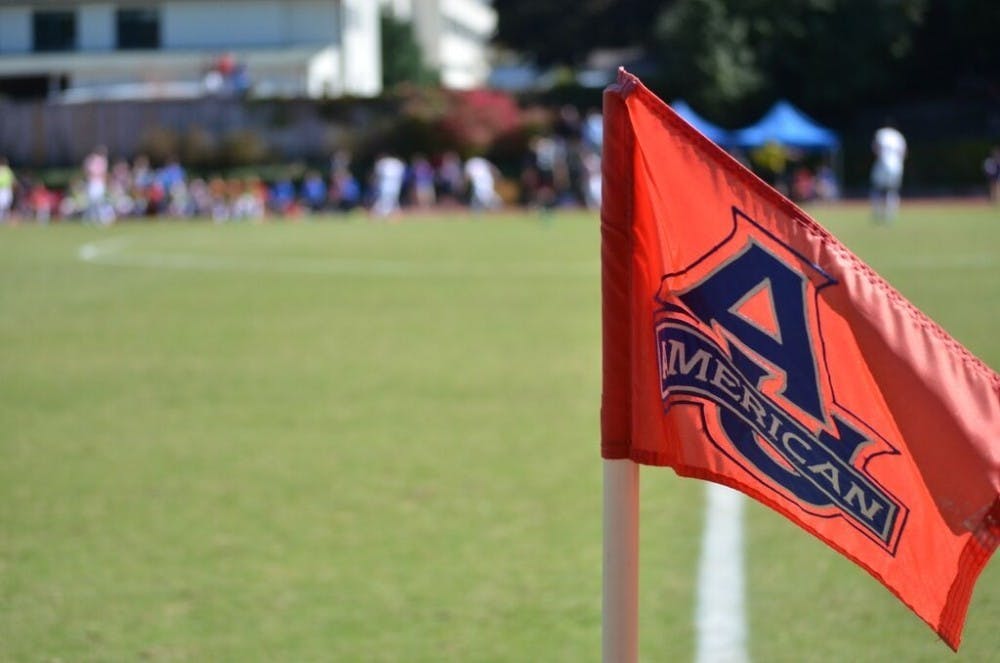Athletes at private colleges, including American University, qualify as employees under federal labor law, National Labor Relations Board General Counsel Jennifer Abruzzo said in a memo on Sept. 29.
The announcement creates protections for athlete unionization and prevents retaliation for advocacy concerning pay and working conditions. Until now, the NLRB has declined to consider whether college athletes are employees for the purposes of collective bargaining over unionization or other aspects of employment.
“Players at Academic Institutions perform services for institutions in return for compensation,” Abruzzo said in a statement. “Certain Players at Academic Institutions are statutory employees, who have the right to act collectively to improve their terms and conditions of employment.”
Although the memo itself has no real legal power, it shows the intentions of the board, said Sam C. Ehrlich, an assistant professor of legal studies at Boise State University.
“Abruzzo said she and the rest of the board will focus on this, putting the NCAA and schools on notice that continued misclassification of athletes as students rather than employees will be attacked,” Ehrlich said. “That will change the game.”
Abruzzo also warned that the continued use of the phrase “student-athlete” by universities could have a “chilling effect” on athletes to exercise their rights under Section 7 of the Wagner Act, which states that workers have the right to unionize, and that the designation is a violation of Section 8 of the National Labor Relations Act., which says that labor organizations cannot restrain workers from exercising their rights to unionize and collectively bargain. However, Abruzzo did not specify how the phrase violated the NLRA.
AU currently displays the phrase “student-athlete” on multiple pages of both its main website and sports website.
The NCAA coined the phrase “student-athlete” in the 1950s to distinguish college athletes as amateurs, and the moniker came into common use after the NCAA won a ruling from the Colorado Supreme Court that said the nonprofit didn’t have to pay workers compensation benefits after a collegiate football player died midgame. However, with the new NLRB ruling, Ehrlich said that the conversation around the controversial phrase has changed for the better.
“Just seeing it from someone at this level in government, talking about how the term ‘student-athlete’ is problematic from a labor perspective is huge for those of us who have fought against it,” Ehrlich said.
Turning intention into action
In a statement to The Eagle, Chief Communications Officer Matthew Bennett said AU had not decided how they will continue to classify their athletes.
“American University is reviewing today’s memo from the National Labor Relations Board, as well as other factors across the NCAA landscape that may affect student athletes’ status in the future,” Bennett wrote in an email on the day of the announcement.
Practically, it may take time for significant changes to occur at the college level. NLRB precedent is set via decisions regarding individual attempts at unionization, similar to court cases. While the memo lays out Abruzzo’s perspective and intention to find organizing attempts where the view can be solidified by a full NLRB decision, athletes need to take the first steps themselves.
“When are athletes gonna unionize? That depends on the athletes,” Ehrlich said. “There are real practical concerns — getting all the athletes in a room together and getting them on the same page. That’s even more challenging.”
In addition, different sports have different needs, Ehrlich said. Athletes from different sports may be interested in contrasting protections that might make the process of forming a union complicated. Discussions around college athlete unionization have recently centered around the most profitable sports: football and basketball, and AU only hosts the latter. Ehrlich was unsure of how many sports may be covered under the memo.
Protection for protest as well
Beyond unionization, the memo also lays out protections from retaliation over advocacy for pay or better working conditions. That sort of speech was highlighted during the George Floyd protests last summer and calls for greater safety measures during the pandemic, when players may have felt exposed for advocating for themselves, Ehrlich said.
The NLRB’s decision has already been met with praise. Senior captain of the AU women’s soccer team Juliana Saling has been at the forefront of athletes pushing for empowerment at AU. Saling is a founding member and now president of the AU Black Athlete Coalition, which seeks to “provide a safe and open environment for Black student-athletes at American University.”
Saling said that she had been following the issue of protecting college athletes’ rights since the NCAA allowed players to profit off their likeness at the end of June.
“I think that this is just a further step in the modernization of certain NCAA regulations, and I think that it does provide student-athletes more liberty to demand better treatment, to be able to make an income while also balancing a rigorous academic and athletic schedule,” Saling said. “But [the NLRB’s ruling] also recognizes the immense time commitment that being a student-athlete makes your daily life. Not being able to go to work at the same hours as other people, having very tight schedules, and not necessarily being able to have that flexibility to take an internship over the summer.”
Saling has not signed a deal to profit off of her likeness, but she said that while sports need to be more representative of the people who play them, the NLRB’s decision provides protections and opportunities for athletes of color.
“I think when it comes to empowerment, having that administrative legal support, knowing that you have that safety to take certain advancements or steps … is a really amazing opportunity,” Saling said.
The NLRB’s decision comes after a triumphant year for advocates of college athlete compensation. The Supreme Court ruled that the NCAA violated antitrust rules by limiting player compensation in a June 2021 decision, and later that month, the NCAA granted college athletes the ability to profit off their name, image and likeness (NIL), something AU athletes have recently embraced.





